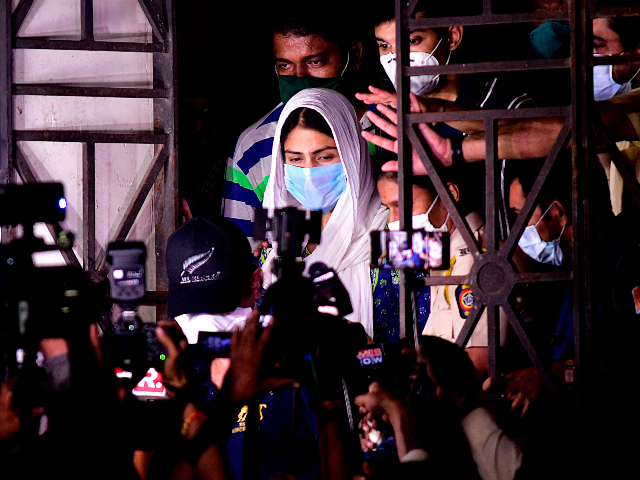India’s Narcotics Control Bureau (NCB) is conducting a high-profile investigation into a drug ring that allegedly includes some top “Bollywood” entertainers and wealthy socialites as its customers.
The NCB has made 20 arrests in the case so far, including a former movie producer named Kshitij Prasad and actress Rhea Chakraborty.
“Senior NCB officials claimed that Prasad, an Executive Producer at Dharmatic Entertainment – a sister concern of Dharma Productions, a production house owned by Karan Johar – was in touch with major drug peddlers in Mumbai,” the Indian Express reported on Sunday.
“Some of these peddlers have already been arrested while the others are yet to be caught. Prasad has told us that he used to procure drugs for his own consumption. We are investigating whether he also used to supply those drugs to others,” an Indian official said.
Prasad looks like the linchpin figure in the case so far, as NCB sources said he is suspected of supplying drugs to several Bollywood celebrities. Prasad is thought to be connected to a major drug syndicate run by a kingpin named Karamjeet Singh Anand who was arrested two weeks ago, along with several of his associates.
Chakraborty was arrested on September 9 and charged with buying cannabis for her boyfriend, a top Bollywood actor named Sushant Singh Rajput who apparently committed suicide in June at the age of 34. His death remains somewhat enigmatic because suicide is a taboo subject in Indian society.
Rajput’s father accused Chakraborty of stealing money from his bank account and helping him commit suicide, charges she denied. Chakraborty’s lawyers argued at her bail hearing on Tuesday that Rajput had a drug habit long predating his relationship with her, and argued she has been absurdly overcharged as a professional drug dealer with up to 20 years in prison on the line.
The NCB opposed Chakraborty’s request for bail, saying that under Indian law buying drugs to supply another person is a “more serious offense” than buying them for personal use. Observers of the case said the NCB is eager to demonstrate that wealth and celebrity will not secure any special treatment for accused members of the drug ring.
Three more Bollywood actors were questioned by the NCB over the weekend. Of the three, Deepika Padukone was the biggest star. She has one major Hollywood film credit, 2017’s xXx: The Return of Xander Cage starring Vin Diesel.
Padukone left a movie set to testify on Saturday, followed soon after by fellow actresses Shraddha Kapoor and Sara Ali Khan. The drug agency also questioned Padukone’s manager Karishma Prakash.
Filmmaker Karan Johar issued a statement on Friday denying allegations that narcotics were used at a party he hosted in July 2019. A video purportedly showing questionable behavior at his party has been circulating on Indian social media amid a growing sense of paranoia that almost anyone in Bollywood could be linked to the expanding drug probe. Deepika Padukone was one of the party attendees, while Kshitij Prasad is linked to Johar’s production company, as mentioned above.
Johar’s party video reportedly came up at a strategy meeting of NCB officials on Monday, even though earlier reports said the NCB did not consider the “drug party” part of their investigation and had no plans to call Johar for testimony.
Sources who attended the meeting said that while not all of the people interviewed in the Bollywood drug investigation have been arrested or charged, none have been entirely cleared of suspicion yet, either. The investigation has reportedly expanded to include at least 20 high-level drug dealers suspected of providing illicit substances to celebrity clients.
Critics of the NCB said the agency has gone overboard in its zeal to prosecute some high-profile celebrities, possibly motivated by pressure from Indian politicians, a desire to improve its stature among international law enforcement operations, and public anger over Rajput’s death. India’s drug laws have been criticized as confusing, heavy-handed, and excessively harsh on small-time users of low-end drugs like cannabis. Chakraborty, for example, was essentially imprisoned for talking about buying and using drugs in chat messages; no physical evidence against her has been made public.
On the other hand, supporters of the NCB note that India has a serious problem with prescription drug abuse in the slums, so the government has reasons to take action against top celebrities who glamorize controlled substances.
As the Hollywood Reporter noted, the involvement of so many celebrities, combined with the NCB’s reluctance to publicize major details of the case, has “created fevered media speculation with the story dominating newspapers, news sites and cable TV in India.”
The rampant rumors include speculation that Rajput, a rising star whose death was a heartbreaking tragedy for Bollywood fans, might have been murdered instead of committing suicide or killing himself in some misadventure caused by drug abuse.
“We don’t know who is next. It’s scary,” an unnamed Bollywood producer told Reuters last week. As with many other countries, India’s huge film industry is on shaky footing after the coronavirus pandemic, so tensions in Bollywood were running high even before the drug case exploded.

COMMENTS
Please let us know if you're having issues with commenting.